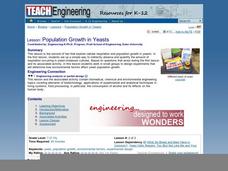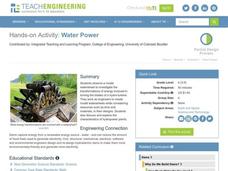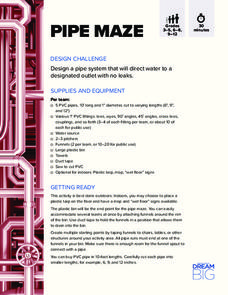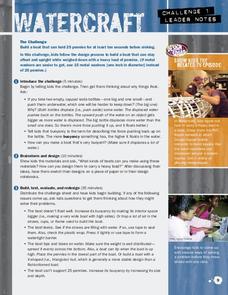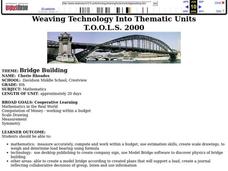Curated OER
Moebius Strips
Learners make Moebius strips and use them to demonstrate the interconnectedness of an environment. They explore the natural cycles (water, oxygen/carbon dioxide, carbon, nitrogen) within the environment. They describe how the cycles are...
Curated OER
Population Growth in Yeasts
Students design an investigation using yeast. In this environmental engineering lesson, students design an investigation to determine how environmental factors affect the growth of yeast. They will collect quantitative data and discuss...
Teach Engineering
Water Power
Young hydrologists observe a waterwheel which helps them investigate the transformations of energy that occur when the blades of a hydro-turbine are turning. They work together in pairs and pretend to be engineers who are building a new...
Discovery Education
Wind Power
How do engineers turn something that is readily available, like wind, into energy? Scholars create a prototype of a wind turbine and attach it to a motor. They test out their prototypes and decide on their effectiveness. They also...
Curated OER
Paper Suspension Bridges: You Want Me To Go Up There?
A few class periods will be required to complete this physics investigation with your high schoolers. There is an unavailable video written into the lesson plan, but there is plenty of material here to bridge the gap. Two terrific...
PBS
Parachute Parade
Sail to the ground with a parachute activity! Kids construct parachutes out of household items and a toy figure, after brainstorming the best way to reduce drag. Once they test their parachutes, they can adjust their projects to optimize...
DiscoverE
Launch It
Launch pupil interest in rockets. Scholars build rockets out of straws and balloons to learn about Newton's Third Law of Motion. Their task is to hit a target five feet away. It's not as easy as it seems!
DiscoverE
Pipe Maze
Here's a lesson that is simply a-MAZE-ing! Introduce science scholars to pipeline systems through a hands-on project. Partnered pupils participate in the design, construct, and test a PVC pipeline maze. Reusable materials and clear...
DiscoverE
Puff Mobiles
You've probably heard of solar-powered cars, but what about wind-powered cars? Scholars build cars that can travel at least six feet. They can only use their breath to move the car—so, obviously, a sail might be a good feature for the...
DiscoverE
Shake It Up with Seismographs
Shake up your lessons on earthquakes. A simple seismograph lets scholars record "earthquakes" in the classroom. These earthquakes occur when classmates drop balls from different heights. Young scientists measure these with seismographs...
DiscoverE
Strong Paper Structure
Paper is a lot stronger than you think. Scholars create newspaper structures that can hold the weight of several books. For the purpose of this activity, the designs must be eight inches tall to be considered complete.
DiscoverE
First You See It, Then You Hear It
Light and sound go hand in hand. Pupils set up a system that will emit sound when a laser is directed at a photodiode. Various objects, such as a comb and talcum powder, allow for modulation of the laser beam. Individuals also...
DiscoverE
Pilot a Balloon
Balloons will go where you want them to. Young pilots first add paper clips to a balloon to make it neutrally buoyant. They then use cardboard to steer the balloon in different directions, taking air pressure into account.
DiscoverE
Electromagnetic Fishing Pole
Let's go fishing ... for paper clips! Individuals create a device that attracts paper clips. This device relies on an electromagnetism, where a flow of electricity in a loop of wire wrapped around a nail causes magnetism.
DiscoverE
Clean It Up
Water, water, everywhere, but not a drop to drink—until we clean it, of course! Scholars design a filtration device that removes pollutants from water. The goal is to have the water come out as clean as possible from the device. How...
DiscoverE
Build a Bridge
Cost overruns are unacceptable—in the real world and in an engaging activity. Groups of pupils get together to build a bridge out of straws, paper cups, and tape. They keep track of costs ($1,000 for each material) and must stay within a...
DiscoverE
Let Your Lights Glow
Put those old holiday lights to good use. Individuals use a section of ornamental lights to create electric circuits. If the lights glow, it's a success; otherwise, it's time to try again!
PBS
Watercraft
Whatever floats your boat—with some additional weight. The first activity in a five-part series challenges pupils to design a boat to hold pennies. Using the design process, learners design, build, and test their boats, making sure they...
DiscoverE
Build a Straw Bridge
Build teamwork skills while building a bridge. Scholars work together in groups to create a bridge out of 20 straws and tape. There is a minimum span length of 25 centimeters, but otherwise, let creativity run wild.
Agriculture in the Classroom
Design 'Y'er Genes
How do changes in DNA affect an organism? Scholars explore chromosomes, genes, DNA, and mutations by modeling the DNA of a strawberry. They build a DNA model, then manipulate it to show how changing the genes transforms the strawberry...
Teaching Tolerance
Understanding Online Searches
Discover what's behind an online search. Scholars read a handout and engage in discussions to learn how to critically evaluate online search results. Then, working in small groups, they create posters listing their demands for search...
Curated OER
Bridge Building
Eighth graders will create model drawings of bridges and integrate technology into the process of creating a visual representation. Technology is used in the industry of design and architecture. This lesson helps to build real life skills.
NASA
Rocket Races
And they are off! Using Styrofoam meat trays and balloons, individuals build racers that demonstrate Newton's Third Law of Motion. Pupils run their racers three times and make improvements between each trial. To conclude the activity,...
National Sailing Hall of Fame
Introduction to Sailboats
The left part of the boat is called what? An informative instructional activity and accompanying slideshow presentation introduce middle schoolers to the terminology and parts associated with a sailboat.



